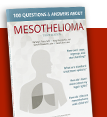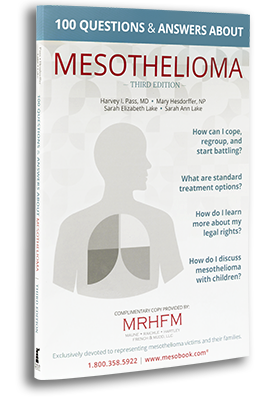Testicular Mesothelioma
Testicular mesothelioma is the rarest form of mesothelioma cancer and is found in the serous membrane, or “tunica vaginalis,” surrounding the testes in men. While it is considered highly aggressive and is known to metastasize rather quickly, testicular mesothelioma accounts for only 1% of 3,000 diagnosed mesothelioma cases in the United States each year.
Testicular Mesothelioma Symptoms
Mesothelioma cancer is caused by the exposure to asbestos. Once the initial exposure to asbestos occurs, mesothelioma can take anywhere from 10 to 60 years to develop as the asbestos fibers build up, creating scar tissue, and eventually, mesothelioma cancer.
Mesothelioma is often misdiagnosed, as mesothelioma victims may be years removed from the exposure once the mesothelioma cancer has developed and is detected. In particular, testicular mesothelioma is often initially diagnosed as a hernia, and typically not found to be mesothelioma until surgery is performed. While testicular mesothelioma is rare, symptoms include:
- Appearance of a lump in the scrotum
- Swelling at the back of the testicles
- Scrotal discomfort
If you are concerned about mesothelioma, your doctor can evaluate any symptoms and determine the appropriate course of action for your treatment, if necessary.
Testicular Mesothelioma Diagnosis
Diagnosing testicular mesothelioma can be very difficult, as symptoms are consistent with other illnesses typically considered to be much less severe. However, if symptoms persist and doctors find that further testing is necessary to arrive at the proper diagnosis, you may undergo various testing including X-Rays, a CT Scan, or a PET Scan. During these tests, doctors will be able to detect any buildup of fluid around the membrane of the testes. If a buildup of fluid or a tumor is found, the fluid or tumor may be tested to determine if the patient has cancer or mesothelioma.
The prognosis for those diagnosed with testicular mesothelioma is often more positive than other types of mesothelioma. Men diagnosed with testicular mesothelioma, on average, experience a median survival expectancy of between 20 and 23 months.
Early diagnosis is crucial in the treatment of mesothelioma. If you have been exposed to asbestos and are experiencing symptoms, alert your doctor immediately.
Testicular Mesothelioma Treatment Options
There are a range of possible treatments for mesothelioma victims, with the most popular being surgery, chemotherapy, and radiation treatments.
In cases where surgery is used to rid the patient of the tumor, partial or entire removal of the testicle(s) is most commonly employed. After surgery, a combination of radiation and/or chemotherapy treatments may be administered. In these cases, a drug called Cisplatin is often employed in Chemotherapy to stop or slow the growth of the cancer.
In some cases, testicular mesothelioma is a secondary form of mesothelioma, meaning the cancer originated in another primary tumor before spreading to the testes. In these situations, appropriate treatment options to remove the primary tumor may be employed as well, as removing the secondary tumor in the testes may not be enough. Additionally, testicular mesothelioma is classified as a very aggressive type of mesothelioma. Many patients, even after a successful surgery, may experience the regrowth of a tumor within two to three years post-surgery.
To learn more about testicular mesothelioma, call toll free 800.300.1893 or click here to receive a free book of answers written by medical professionals who have experience in treating mesothelioma.


 Get Your
Get Your 